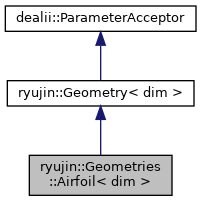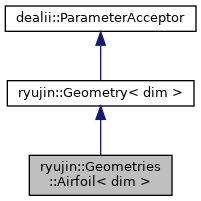 |
ryujin 2.1.1 revision 46bf70e400e423a8ffffe8300887eeb35b8dfb2c
|
 |
ryujin 2.1.1 revision 46bf70e400e423a8ffffe8300887eeb35b8dfb2c
|
#include <source/geometries/geometry_airfoil.h>


Public Member Functions | |
| Airfoil (const std::string &subsection) | |
| void | create_coarse_triangulation (dealii::Triangulation< dim > &triangulation) const final |
 Public Member Functions inherited from ryujin::Geometry< dim > Public Member Functions inherited from ryujin::Geometry< dim > | |
| Geometry (const std::string &name, const std::string &subsection) | |
| virtual void | create_coarse_triangulation (dealii::Triangulation< dim > &triangulation) const =0 |
| virtual void | update_dof_handler (dealii::DoFHandler< dim > &) const |
| virtual HP_Collection | populate_hp_collections (const unsigned int, const bool, typename ryujin::Discretization< dim >::Collection &) const |
Additional Inherited Members | |
 Public Types inherited from ryujin::Geometry< dim > Public Types inherited from ryujin::Geometry< dim > | |
| enum class | HP_Collection { standard_quadrilaterals , standard_simplices , populated_by_geometry } |
A generic 2D Airfoil
This class implements a generic 2D airfoil. Various runtime parameters select the airfoil type (such as NACA 4 digit, some ONERA airfoils, etc) and meshing behavior. The mesh construction is divided into various steps:
1/ Parametrization:
Depending on various runtime parameters a parameterization \( y =
\psi_{\text{up./lo.}}(x)\) on the upper and lower trailing edge as well as a parameterization in polar coordinates \( r = \psi_{\text{fr.}}(\phi) \) for the nose part is constructed. This is done by taking a sample of points on the upper and lower part of the airfoil and computing intermediate points with a cubic spline interpolation. Relevant runtime parameters are airfoil type to specify the type and serial number, psi samples to control the number of samples taken (if admissible), and psi center to control the center point for constructing the parametrizations \(\psi_{\text{x}}\). The samples are assumed to be normalized so that the front is located at \((0,0)\) and the trailing (or blunt edge) at \((1,0)\), or \((1,\ast)\), respectively. The coordinate system is then shifted by the psi center point so that the parameterizations \(y = \hat\psi_{\text{up./lo.}}(x)\) expect input in the range \(\hat x\in[0,1-x_{\text{psi center}}]\). In the same spirit \(\hat\psi_{\text{fr.}}(\phi)\) expects input in the range \(\pi/2\le\phi\le3\pi/2\) and will return \(\psi_{\text{fr.}}(\pi) = -x_{\text{psi center}}\). Also a final step the normalized parametrizations \(\hat\psi\) are rescaled with the runtime parameter airfoil length so that the resulting airfoil has overall length airfoil length instead of 1.
2/ Meshing:
TODO
Definition at line 825 of file geometry_airfoil.h.
|
inline |
Definition at line 828 of file geometry_airfoil.h.
|
inlinefinalvirtual |
Create a coarse triangulation representing the current Geometry. This virtual method needs to be implemented in a derived classes.
Implements ryujin::Geometry< dim >.
Definition at line 908 of file geometry_airfoil.h.
References ryujin::dynamic, ryujin::no_slip, ryujin::periodic, and ryujin::pow().